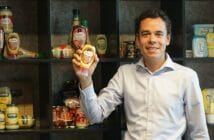“Unilever is passionate about diversity. I think we have to remember that that means not just gender diversity or racial diversity, but diversity of different types of people and thinking”
Steve Miles, Global Senior Vice President, Dove
We believe that diversity is the bedrock of Unilever. Unilever itself is an Anglo-Dutch company, harking it’s roots back to Great Britain and The Netherlands. From a diverse range of products, in a diverse range of brands and sectors, diversity is at the very core of Unilever and continues to be key to the ongoing growth of the business.
In order to succeed in today’s globalised workplace, a company’s workforce must be diverse to better understand the needs of the consumers and the market as a whole. On a normal working day for us in Unilever’s global headquarters in London it is pragmatic to say that a cacophony of languages can be heard. An Argentine may be speaking Italian, a British person speaking German, in Home Care Hindi can often be heard, and this diversity is what makes working at Unilever such a fulfilling experience. Our teams are made by people from all corners of the world, who bring their personal vision of the world and bright ideas into work, providing us valuable lessons everyday from their different ways of working.
Not only is the range of languages wide, but the people and their cultural backgrounds is what enables Unilever to stay in touch with consumers far and wide. As an example of how relevant diversity is, people that were born and raised in Asia, but at some point have worked in Latin America, may be more sensitive on understanding the importance of mate tea to local people from that region. This mix of cultural backgrounds brings realistic and relevant perspectives into the company, enabling a closer relationship between brands and people. This was quite surprising, at start, but we quickly realized how positive and useful it is. We soon felt completely integrated and part of one whole entity.
It is this richly diverse web of people, which allows Unilever to be relevant to consumers all over the world, as these little intrinsic facts help make the much needed difference in this evolving, cluttered and competitive marketplace. According to Amita Chaudhury, Global Diversity Director at Unilever, diversity is about embracing difference at all levels – across physical and cultural boundaries, time zones, life stages and management styles – to come together as a perfectly synced team. Diversity in the workplace is the cornerstone of the business, therefore understanding that and embracing the things that make people so unique is what sustains a good company culture and pushes people to learn and grow more everyday.
On top of this, when recruiting, Unilever puts all efforts on choosing the best candidate for the job, providing equal opportunities for men and women, with the last comprising 45% of the company’s management in 2015. Also, the support is visible for Lesbian, Gay, Bisexual, Transgender (LGBT) through several initiatives worldwide, such as internal programmes, and by allying with brands externally, in order to generate opportunities for open dialogues and a transparent culture.
Unilever is one of the biggest multinational companies, present in numerous and various markets, thus having teams with different nationalities becomes a real advantage. Employing more than 150 differents nationalities is a real asset for Unilever as it helps improving collaboration, innovation, work quality and gives individuals the right to shine, confident that their background is respected and valued.
Diversity is, as well, very good illustrated through the UIIP program. Indeed, we are all from different nationalities (Portuguese, Italian, German, French, Indian etc) and diverse backgrounds, some having already graduated, others being in their bachelor or master studies.
So wherever you are coming from culturally, educationally, your experience and personality will be unique; you will have the opportunity to leave your own legacy.





